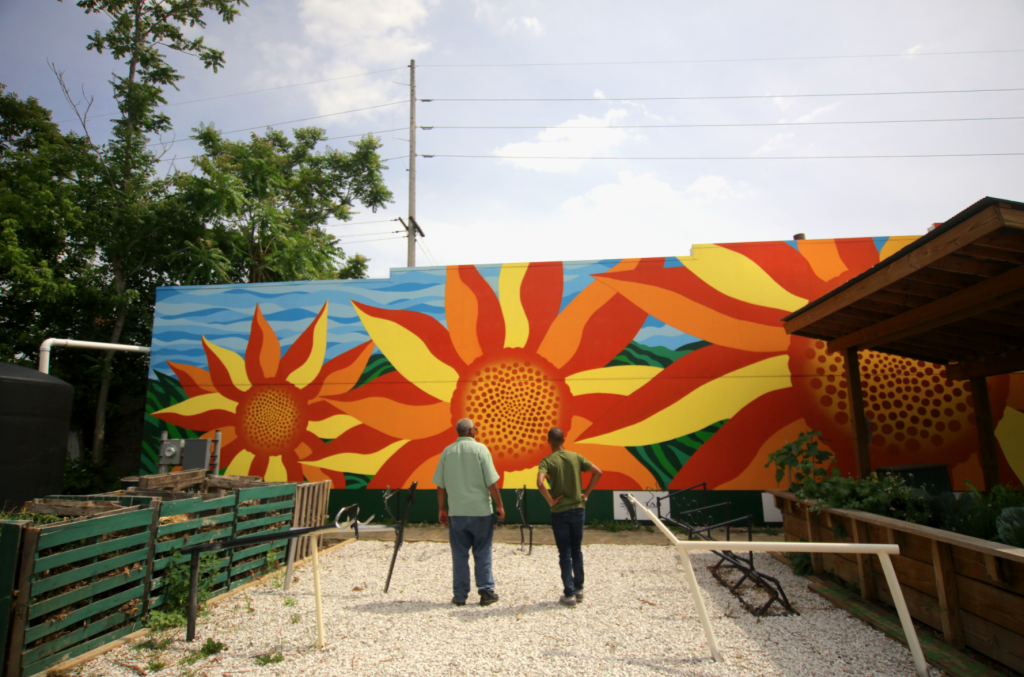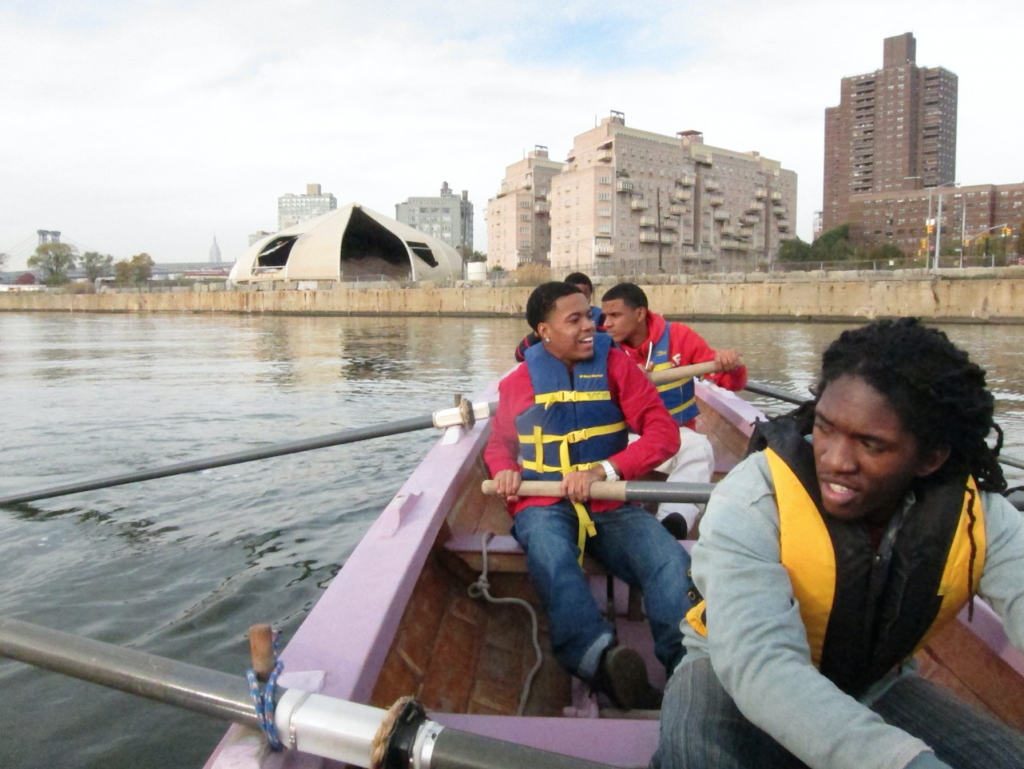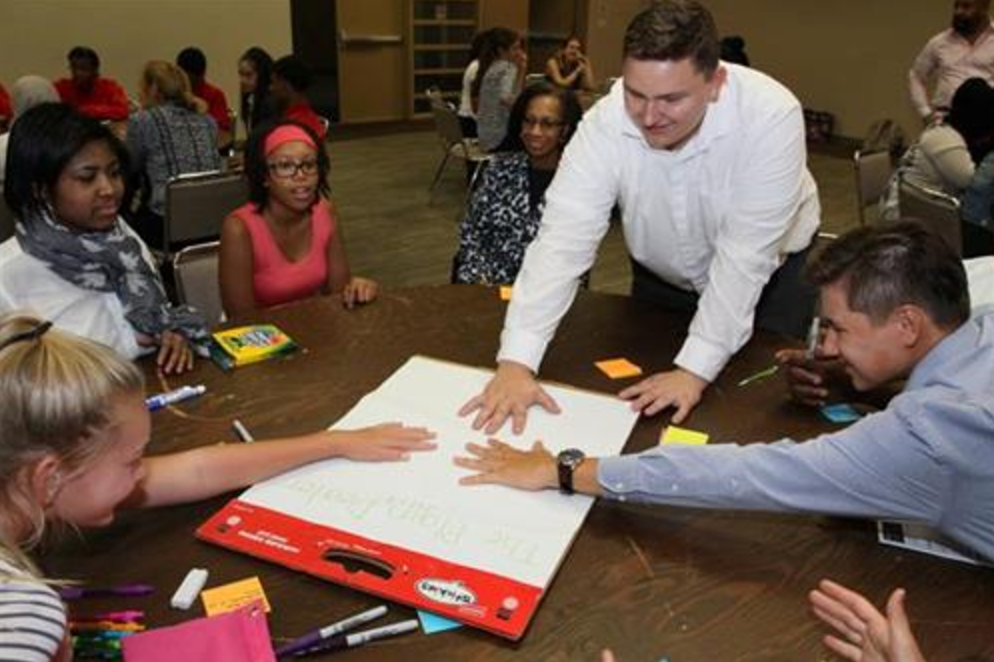Why crowdfunding your neighborhood project is better than writing a grant
Published May 18, 2017
[“Why crowdfunding” originally appeared on strongtowns.org.]
Whether you’re planning to paint a mural, build a community garden, or create a pop-up bike lane, when it comes to neighborhood improvement, you’re dedicated to making the biggest possible impact. You might work for an established 501(c)3 nonprofit organization, or maybe you’re just part of a small group of neighbors with a good idea. In any case, as you think about how to turn your idea to reality, the question of “how we pay for it” has probably popped up. Competition for small grants can be fierce, and their uncertainty, long turnaround time, and reporting requirements can be a burden on grassroots groups. This is why more and more neighborhood changemakers are turning to civic crowdfunding as an alternative, or even a supplement, to grants. Why crowdfunding? Read on!

At ioby, we work with community groups and neighbors around the country to plan, fund, and implement positive change on a local level. We’ve helped raise more than $3 million in small donations for projects that make neighborhoods healthier, more vibrant and more full of opportunity. And every day we coach community leaders — from established nonprofits to community-minded individuals — on how to raise the money they need, while building their networks, strengthening their neighborhoods, and growing their capacity as leaders. We think when it’s done well, crowdfunding can build a neighborhood’s civic strength in a way that traditional philanthropy can’t. Here are some of the reasons why:
1. “Making the ask” while crowdfunding within your community will help you grow a list of supporters.
Nobody, and we mean nobody, wakes up every day excited to ask for money. However, making the ask through crowdfunding is a muscle worth building up, and we promise it gets easier the more you do it. What better way to diversify your revenue streams than by asking for a small amount from a lot of people? By being out and visible in your community, and making it clear that you want to work with your neighbors to improve the place you all care about, you’ll gain allies and supporters who will make a difference beyond your immediate project. You’ll collect names and email addresses, and next time your project or organization has a milestone or needs a coalition of support, you’ll have a head start!
2. Talking about your project within your community can bring valuable information.
Another good reason why crowdfunding: it’s built-in community engagement. You’ll find yourself telling the story of your project over and over again, and you’ll no doubt get some useful feedback. Is Saturday morning actually a bad time for a pop-up event? Did one of your neighbors try planting trees a few years back and learn something useful about city permits? By letting your neighbors participate when the idea is still in its early stages, you’re not only crowdsourcing the funding of your project, you’re refining your idea and perfecting your project so you can best serve your community.

3. Crowdfunding allows more space for experimentation.
Time for some real talk about traditional philanthropy: if you’ve ever written one, you know that even the smallest grants can come with lengthy applications and onerous reporting requirements. Even more challenging, you’re often asked to predict or quantify your impact in certain ways to prove that the project was a success using the funder’s own metrics. In reality, many neighborhood-scale projects are experiments, and can be huge, and productive, learning experiences for the people organizing them. Small organizations should be trusted to experiment, pilot, tweak and perfect projects and programs. Crowdfunding can bring more freedom from the fear of failure that be a barrier to grassroots groups trying new things.
4. Success has many parents.
Imagine a vacant lot transformed into a bustling and vibrant community garden. That’s a positive change, right? Now imagine every single person on the block walking by the garden and thinking, “I helped build that.” Those neighbors are built-in advocates, caretakers, and protectors of that new space. They’re probably more likely to hang out there, to volunteer, and to talk with each other about other challenges in the neighborhood. To use a social science term, this is “social resiliency,” and it can help build the foundation for a community to stay intact in the face of challenges. In short, you may be building more than just a garden.

5. You’re not an established org…
It can be tough for fledgling groups to get grants. With no paid staff, little track record of success, and little administrative capacity, even a small amount can be a heavy lift. If this sounds familiar, you may be part of what ioby calls the “deep roots,” new or informal groups that are all-volunteer and don’t have 501(c)3 status. Crowdfunding from within your community can be a great first step towards incorporation and growth, if that’s your goal. Just as important, a trajectory of growth is not always the right choice for fledgling groups like yours. Maybe you want to stay small and just focus on doing one project extremely well. Sometimes that’s the right move, and crowdfunding can allow you that flexibility.
6. …Or you are!
About one-third of the projects supported by ioby come from established medium-to-large budget 501(c)3s who regularly raise money in a variety of ways. Certain programs might be supported by grants, corporate sponsorships, individual giving or membership programs. Still, a crowdfunding campaign can do things that none of these funding streams can: it can invigorate a donor base by creating a sense of urgency and visible progress; it can allow you to take risks on innovative programming; it can allow you to respond to a crisis or immediate funding need; and it can help you engage your donors to make the ask for you using social media and other tactics. Crowdfunding should be part of your nonprofit fundraising toolbox, no matter what your operating budget is.
And remember, “crowd” is the most important part of crowdfunding. You won’t have to go it alone! Our staff is dedicated to taking the time with you to find out about your funding needs and help you build a fundraising plan that works with your community, your timeframe, and your needs. Tell us your idea: It’s our mission to support neighbors in making positive change within our communities, and we’re here to help you succeed.
